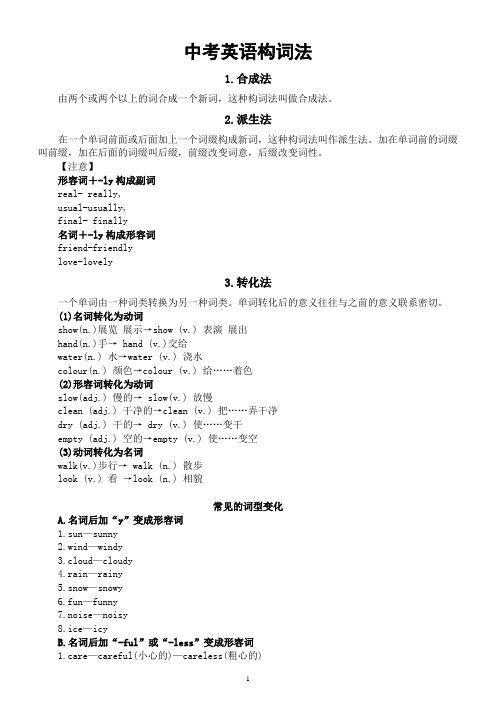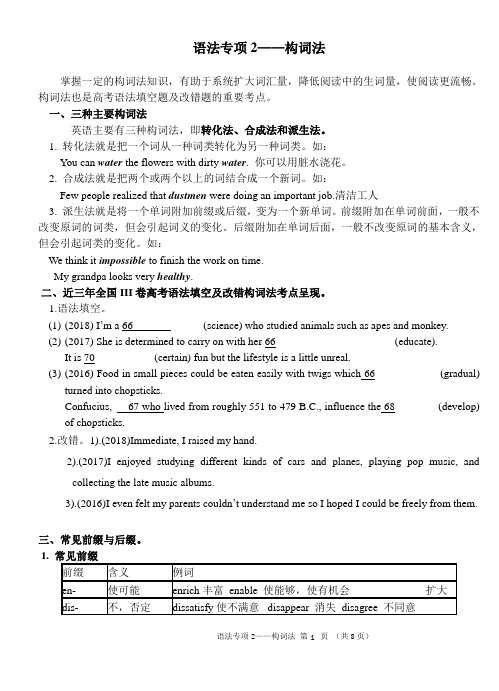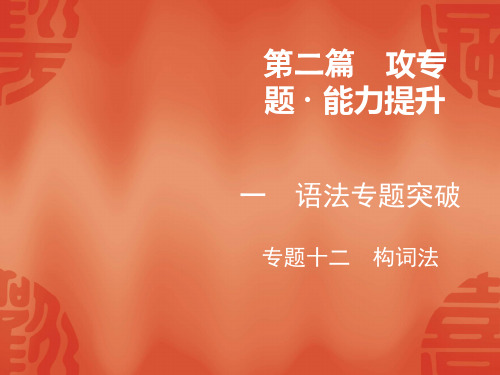2020中考英语:构词法专题详解
- 格式:docx
- 大小:17.59 KB
- 文档页数:5

中考英语构词法1.合成法由两个或两个以上的词合成一个新词,这种构词法叫做合成法。
2.派生法在一个单词前面或后面加上一个词缀构成新词,这种构词法叫作派生法。
加在单词前的词缀叫前缀,加在后面的词缀叫后缀,前缀改变词意,后缀改变词性。
【注意】形容词+-ly构成副词real- really,usual-usually,final- finally名词+-ly构成形容词friend-friendlylove-lovely3.转化法一个单词由一种词类转换为另一种词类。
单词转化后的意义往往与之前的意义联系密切。
(1)名词转化为动词show(n.)展览展示→show (v.) 表演展出hand(n.)手→ hand (v.)交给water(n.) 水→water (v.) 浇水colour(n.) 颜色→colour (v.) 给……着色(2)形容词转化为动词slow(adj.) 慢的→ slow(v.) 放慢clean (adj.) 干净的→clean (v.) 把……弄干净dry (adj.) 干的→ dry (v.) 使……变干empty (adj.) 空的→empty (v.) 使……变空(3)动词转化为名词walk(v.)步行→ walk (n.) 散步look (v.) 看→look (n.) 相貌常见的词型变化A.名词后加“y”变成形容词1.sun—sunny2.wind—windy3.cloud—cloudy4.rain—rainy5.snow—snowy6.fun—funny7.noise—noisy8.ice—icyB.名词后加“-ful”或“-less”变成形容词1.care—careful(小心的)—careless(粗心的)e—useful(有用的)—useless(无用的)3.help-helpful(有帮助的)-helpless(无帮助的)4.harm-harmful(有害的)-harmless(无害的)C. 名词后加“-ern”变成形容词1.east—eastern(东方的)2.west—western(西方的)3.south—southern(南方的)4.north—northern(北方的)D.名词后加“-al”变成形容词1.person—personal (个人的)cation—educational(有教育意义的)3.tradition—traditional(传统的)4.medicine—medical(医学的)E.名词后加“-ed”或“d”变成形容词1.talent—talented(有才能的)2.balance—balanced(均衡的)H.名词后加“-en”变成形容词1.wool—woollen(羊毛的)2.wood—wooden(木制的)I.名词转化为形容词的不规则变化1.energy—energetic (有活力的)2.athlete—athletic(体育运动的)3.hunger—hungry (饥饿的)4.pride—proud(自豪的)5.death—dead (死的)6.science—scientific (科学的)7.knowledge—knowledgeable (有知识的)8.anger—angry (生气的)9.Africa—African (非洲的)10.America—American(美国的) 11.Brazil—Brazilian(巴西的)12.Canada—Canadian(加拿大的)13.Italy—Italian(意大利的)14.Russia—Russian(俄罗斯的)15.Swede—Sweden(瑞士的)16.France—French(法国的)17.China—Chinese(中国的)18.England—English(英国的)19.Japan—Japanese (日本的)20. Britain—British (英国的)J.动词变名词1.teach—teacher (教师)2.drive—driver(司机)3.write—writer(作家)4.dance—dancer(舞蹈家)5.win—winner (获胜者)6.run—runner(赛跑者)7.visit—visitor (参观者)8.invent—inventor(发明家)9. translate—translator(翻译家)cate—educator(教育家)11. describe—description(描述) 12.predict—prediction(预言)13.collect—collection(收藏)14.decide—decision(决定)15.build—building(建筑物)16.mean—meaning(意思)17.die—death(死亡)18.fly—flight (飞行)19.know—knowledge(知识)20.please—pleasure(高兴)21. pronounce—pronunciation(发音)22.mix—mixture(混合物)K. 动词变形容词1.please-pleasing(令人高兴)-pleased(感到高兴的)2.surprise-surprising(令人惊讶的)-surprised(感到惊讶的)3.excite-exciting(令人兴奋的)—excited(感到兴奋的)4.interest-interesting(令人感兴趣的)-interested(感兴趣的)5.worry-worrying(令人担忧的)-worried(感到担忧的)(类似单词有:amaze, annoy, bore, disappoint, embarrass, frustrate, relax, terrify, thrill, tire等)L.形容词的变化1)形容词变副词quick—quickly(迅速地)strong—strongly(强烈地)heavy—heavily(重重地)angry—angrily(生气地)healthy—healthily(健康地)noisy—noisily(吵闹地)terrible—terribly(可怕地)possible—possibly(可能地)2)形容词变名词kind—kindness(善良)happy—happiness(幸福)warm—warmth(温暖)safe—safety(安全)confident—confidence(信心)important—importance(重要性)different—difference(差异)true—truth(真理)long—length(长度)honest—honesty(诚实)。


构词法(一)基础讲解英语词的构成有一定的规律,这种规律称为构词法。
掌握构词法对在文本中,理解、猜测新词、难词、怪词的词义有很大的帮助。
在扩展词汇量的过程中,能起到倍增器”的效果。
常见的构词法有:转化法、合成法、派生法、截头法、去尾法、混成法等。
在应用中,以前三种方法是用最广泛。
1、转化法转化就是在词形不变的情况下,一个单词有一种词性转换为另一种词性。
转换后的词义一般与原意有密切关系,但有时差异很大。
对于双音节词转换后,读音也常常发变化。
转化法一般有如下几种情况:⑴动词转名词Look v.看7 n相貌⑵名词转动词Air n.空气^v通风⑶形容词转动词Empty a.空的7 v倒空⑷形容词转名词Right a右边的t n右侧⑸形容词转副词Long a 长的7 ad.xx2、合成法就是将两个或两个以上的词合成的一个新词。
合成词各个成分之间有的要用连字符连接,有的直接连在一起。
3、派生法是在一个词根的前面或后面加上某个词缀来产生新词。
加在前面的叫前缀,加在后面的词缀叫做后缀。
前缀多引起词义的变化而不改变词性。
后缀对词性、词义都可能有影响。
例如:dis agree ment (不同意n .)前缀词根后缀4、截短法(缩略法)截短法,即将单词缩写,词义和词性保持不变,主要有截头、去尾、截头去尾等形式。
⑴截头telephone t phone aeroplane t planeomnibus bus⑵去尾mathematics t mathsco-operate c o pexamination examkilogram kilolaboratory labtaxicab taxi⑶截头去尾influenza flurefrigerator fridgeprescription script5、混合法(混成法)混合法,即将两个词混合或各取一部分紧缩而成一个新词。
后半部分表示主体;前半部分表示属性。
news broadcast newscOS闻广播television broadcast telecastsmoke and fog smOglfhelicopter airport — helporfc 机场6、首尾字母缩略法,即用单词首尾字母组成一个新词。

语法专项2——构词法掌握一定的构词法知识,有助于系统扩大词汇量,降低阅读中的生词量,使阅读更流畅。
构词法也是高考语法填空题及改错题的重要考点。
一、三种主要构词法英语主要有三种构词法,即转化法、合成法和派生法。
1. 转化法就是把一个词从一种词类转化为另一种词类。
如:You can water the flowers with dirty water. 你可以用脏水浇花。
2. 合成法就是把两个或两个以上的词结合成一个新词。
如:Few people realized that dustmen were doing an important job.清洁工人3. 派生法就是将一个单词附加前缀或后缀,变为一个新单词。
前缀附加在单词前面,一般不改变原词的词类,但会引起词义的变化。
后缀附加在单词后面,一般不改变原词的基本含义,但会引起词类的变化。
如:We think it impossible to finish the work on time.My grandpa looks very healthy.二、近三年全国III卷高考语法填空及改错构词法考点呈现。
1.语法填空。
(1)(2018) I’m a 66 ______(science) who studied animals such as apes and monkey.(2)(2017) She is determined to carry on with her 66______________________(educate).It is 70___________(certain) fun but the lifestyle is a little unreal.(3)(2016) Food in small pieces could be eaten easily with twigs which 66____________(gradual)turned into chopsticks.Confucius, 67 who lived from roughly 551 to 479 B.C., influence the 68________(develop) of chopsticks.2.改错。


构词法一、转化法(兼类词):指在不同的语境中,名词动用,动词名用等。
如:ok was the first to map (v.)the east coast.(库克是第一个画西部海岸地图的人)2.The house can house (v.)many people.(这房子可以住下好多人)二、合成词:英语中的合成词有合成形容词、合成名词、合成动词、合成副词、合成动词、合成代词等,如:合成形容词:well-known, warm-hearted, easy-going合成名词:raincoat, earthquake, waterfall,blackboard, classroom, motherland合成动词:underline, overcome,合成副词:maybe, wherever, however, therefore合成代词:himself, everyone, nobody三、派生法(词缀法或缀合法),这种词是最为活跃的一种,大约三分之二的英语单词是用这种方法构成的。
因此,掌握一些常用派生词的构词规律对于我们正确拼写单词和在阅读中猜词能力的培养就显得尤为重要。
在英语的派生词中,词根决定词的根本意义,前缀改变词义,后缀引起词类的的改变(个别后缀还会改变词义)1.名词后缀-er:writer, teacher, manager, worker, employer, interviewer-ee: employee, interviewee-or:actor, sailor, editor, beggar, operator-ian:librarian, American, physician-ist:scientist, physicist, artist, cyclist, typist, biologist, geologist-ese:Chinese, Japanese(-er, -ee,-or, -ian, -ist, -ese: 表示“从事某种职业或来自------的人” )-ism:Marxism, socialism, nationalism, communism (-ism表示----主义)-ess:actress, waitress, hostess (-ess表示性别)-ness:happiness, illness, coldness, carelessness, sickness-ment:movement, agreement, achievement, appointment, adjustment-ship:friendship, hardship(困苦、苦难、艰难困苦)-ion:education, decision, communication, impression, description, collection-ity:reality, purity, responsibility, possibility-ance(ence):performance, independence, science , violence, reference, appearance-ure:failure, departure(分离,分开)-al:arrival,survival, signal-hood:childhood, boyhood, neighborhood, livelihood-th: truth, depth,(-ism, -ess, -ness, -ment, -ship, -ion, -ity, -ance(ence), -ure, -al, -hood, -th: 表示“行为的过程、状态或性质”)2.形容词后缀-less: hopeless, endless, careless, helpless, (表“否定”)-ful: useful, careful, hopeful, grateful, powerful-ous:dangerous, humorous, cautious, infectious-able:enjoyable, comfortable, considerable, admirable, unforgettable-y:snowy, dirty, greedy, rainy, sunny, guilty-ent(-ant):different, independent, confident, violent, efficient, distant-tic: optimistic, pessimistic, enthusiastic, characteristic-ary: necessary, revolutionary, imaginary-(c)al: historical, unusual, professional, magical, physical, universal, classical, logical, informal-some:handsome,troublesome-en:woolen, golden,-an:African, American-ive:active, attractive, creative(-ful, -ous, -able, -y, -ent, -some, -en, -an, -ive :表示“属性、倾向、相像”)3.副词后缀-ly:really, nearly, differently, finally, fluently, gradually-wise: (表示“方向、样子、状态、在------方面”)likewise, otherwise-ward(s): upward, downward, inward, outward, backward, forward, afterwards4.动词后缀-ize(-ise): organize, apologize, specialize-en:harden, fasten(使固定、使牢固), soften-fy: beautify, simplify, classify-ate: separate, operate(-ize(-ise), -en, -fy, -ate: 表示“使成为、处理、作用”)5.反义词前缀un-: unfair, unknown, unlike, unwilling, unfit, unnecessary, unlikely, unkinddis-: dislike, disappear, disadvantageim-: impossible, immoral, impatient, impractical, improperin-: incorrect, inappropriate, informalnon-: nonsmoker, nonsense,non -drinker(un-, dis-, im-, in-, non-: 表示“无、不、非”)mis-: mistake, mislead, misunderstandmal-:malfunction(发生故障;不起作用)(mis-, mal: 表示“反动作”)6.其他表示空间、位置、方向、关系、程度的前缀(1) a- , up-, over-, sur-, super- : 表示“在------之上”aboard, uphill, overlook, surface, supermarket, superstar(2)extra-, ex-, out- :表示“在-----之外”:extraordinary, export, outside, outdoors(3)under-, sub-, vice- :表示“在----之下”:underground, subway, vice-president(4)inter-: 表示“两者间”:internet, international, interpersonal(5)co-, con-, col-, com-: 表示“相同、相等合作”coexist(共存,和平共处), connect, collect, combine(6)trans-:表示“移动” translate, transform, transmit(传输信号等),transfer(转让、转移)(7)anti-反,抗,阻:anti-black, antibody, anti-depressant(抗抑郁的)(8)re-再,又:rebuild, rewrite, retell(9)micro-microbiology, microcomputer, microscope, microwave(微波)(10)tele-:远距离的,远的:telephone, television, telescope, teleprinter(电传打印机)四、缩略词缩略:为了称说方便,使事物称谓中的成分进行有规律的节缩或者省略叫做缩略。
语法专题训练(九) 构词法(限时:30分钟)根据句子意思,用括号中所给单词的正确形式填空。
1.All the girls were breathing (heavy) after the 800-metre race.2.Don't pour the (pollute) water everywhere, or you'll be punished.3.It's (polite) of you to shout at others in public.You must have good manners.4.—Are there any (different) between the two sentences?—Sorry, I don't know.5.The more (careful) you work, the more mistakes you will make.6.The kids seem very (satisfy) with themselves.7.After class, children should go out of their classroom to enjoy the (warm) of the sun.8.In China, most of the (north) people like to eat dumplings.9.I like reading and writing, and I want to be a (write) when I grow up.10.My father is very (humour) and often makes us laugh.11.At the class meeting, our teacher gave us quite a few (suggest) on how to get on well with each other.12.Mr Dean was (thank) to the policeman who had helped his kids arrive safely.13.Mary and Tony are a pair of pet pigs. The two have recently got a special license so that their (own) can take them for a walk.14.My mother is (care) and sometimes she leaves the house with the door open.15.A person who doesn't like fishing usually looks (patient) in doing his work.16.He's very excited about the (possible) of playing for England's first team.17.With the money we have (success) sent many poor children to school.18.We have made a (decide) to climb the mountain tomorrow.19.China is now working (close) with many foreign countries to practise “the Belt and Road Initiative(一带一路倡议)”.20.Don't take the magazines away. They are for that (science).21.All their efforts seemed (help), so they decided to give it up.22.The (nation) Day of China has become a 7-day holiday for people to travel and relax.23.Don't use the lift when you escape from a high (build) during a fire.24.Tom likes China because Chinese people are (friend).25.Henry is a(n) (honest) boy, so all of his friends hate to play with him.26. (luck), this man lost his wife and two children in the earthquake.27.We are sad about the (pollute) of our environment.28.Nick's mother worries about his (healthy) lifestyle, though he is a college student.29.Qi Baishi was one of the most famous (art) in China.30.To complete the work, he drank some coffee to keep himself (wake).31.All the people in the world wish to enjoy a beautiful and (peace) life.32.We are still (sure) now if my friend will visit me.33.Once a week my business suit is (smooth) ironed.34.Wild animals which are now in danger need our (protect).35.What a pity! Sue lost the game because the (weigh) of her shoes made it difficult for her to run fast.36.Would you mind giving me some (advise) on how to plant trees?37.It is (polite) to keep others waiting in many Western countries.38.Ben was very (luck) to have a “dog helper”.39.Mobike is considered to be a new (invent) in China.40.The mother said goodbye with a smile, but her eyes couldn't hide her (sad).41.If you don't have a deep love for something, don't be (satisfy) until you find one.42.I felt (relax) lying in the sun on the beach.43.Have you ever cut your finger on the edge of a book page? The small cut on your finger is so (pain).44.There are about 6,000 languages that are spoken around the world, but 43% of them are dying out. If no (act) is taken, some of these languages will disappear.45.Our team lost the game because we played very (bad).46.Greenhouse gases are (harm) to the environment.47.Every year many foreign (tour) come to visit the Great Wall of China.48.Which is more (value) to you, health or wealth?49.For your own (safe), please do not walk about on the plane.50.One needs three things to be (true) happy in life: something to do, someone to love andsomething to expect.51.It's (danger) to play with fire.52.More and more people have realized the (important) of China-Russia Heihe Bridge.53.Many foreigners, including (Australia), are visiting Expo 2019, Beijing(北京世园会).54.As we know, HUAWEI technology has been developing (rapid).55.—Uncle John seems to be more (cheer)today.—Yeah. He's got his favourite stamp.56.China has made great (achieve) since it opened its doors to the outside world.57.Nanjing is developing so (quick) that more and more graduates choose to work here.58.I think I can work out the problem without (difficult).59.It is still (know) whether all the students in our class have passed the exam.60.Mark was the (win) of the competition.61.The new flyovers(立交桥) close to our school will be in (serve) next year.62.In the modern world, we should pay more attention to food. We should try to enjoy a better and (health) diet.63.The passage is about the (introduce) to this new kind of machine.64.The cups are (special) designed for the disabled.65.What can we do (improve) our living conditions?66.It's cool and (sun) in autumn in our hometown.67.David fell (sleep) in class because he stayed up too late last night.68.We can't walk (cross) the street when the traffic light is red.69.Smiles on the (swim) faces showed how they enjoyed the race.70.The UK is an old (Europe) country, where there are many palaces and castles.71.Andy is a(n) (active) boy. He seldom takes part in activities.72.If humans do nothing, the small island will (appear) soon.73.The film is directed by Samuel, one of the new (direct).74.I often (mistake) Lily for her twin sister Lucy.75.ORBIS is one the (internation) charities.【参考答案】1.heavily2.polluted3.impolite4.differences5.carelessly6.satisfied7.warmth 8.northern 9.writer10.humorous 11.suggestions 12.thankful13.owner(s) 14.careless 15.impatient16.possibility 17.successfully 18.decision19.closely 20.scientist 21.helpless22.National 23.building 24.friendly25.dishonest 26.Unluckily27.pollution 28.unhealthy29.artists 30.awake 31.peaceful32.unsure 33.smoothly 34.protection35.weight 36.advice 37.impolite38.lucky 39.invention 40.sadness41.satisfied 42.relaxed 43.painful44.action 45.badly 46.harmful47.tourists 48.valuable 49.safety50.truly 51.dangerous 52.importance53.Australians 54.rapidly 55.disabled56.achievements 57.quickly 58.difficulty59.unknown 60.winner 61.service62.healthy 63.introduction 64.specially65.to improve 66.sunny 67.asleep68.across 69.swimmers' 70.European71.inactive 72.disappear 73.directors74.mistake 75.international赠送:初中英语代词Ⅰ.词汇运用。
构词法考点聚焦和精讲【中考构词法考点聚焦】1、转化法;2、派生法;3、合成法;4、截短法(缩略法);5、混合法(混成法);6、首尾字母缩略法。
英语的构词法主要有:转化法、派生法、合成法、截短法(缩略法)、混合法(混成法)和首尾字母缩略法。
一转化法在英语中,有的名词可作动词,有的形容词可作副词或动词,这种把一种词性用作另一种词性而词形不变的方法叫做转化法。
1. 动词转化为名词:很多动词可以转化为名词,大多意思没有多大的变化(如下①);有时意思有一定变化(如下①);有的与一个动词和不定冠词构成短语,表示一个动作(如下①)。
①Let’s go out for a . 我们到外面去散步吧。
①Let’s have a . 咱们游泳吧。
①He is a man of strong . 他是一个体格健壮的汉子。
2. 名词转化为动词:很多表示物件(如下①),身体部位(如下①),某类人(如下①)的名词可以用作动词来表示动作,某些抽象名词(如下①)也可作动词,①Did you a seat on the plane? 你订好飞机座位了吗?①Please me the book. 请把那本书递给我。
①She her husband back to health. 她看护丈夫,使他恢复了健康。
①We together. 我们在一起吃了午餐。
3. 形容词转化为动词:有少数形容词可以转化为动词。
1.We will try our best to our living conditions. 我们要尽力改善我们的生活状况。
2.He down at the crossroad. 他在十字路口减速。
3.Please up the cold meat. 请把冷肉热一下。
4. 副词转化为动词:有少数副词可转化为动词。
Murder will . (谚语)恶事终必将败露。
5. 形容词转化为名词:表示颜色的形容词常可转化为名词(如下①);某些形容词如old, young, poor, rich, wounded, injured等与the连用,表示一类人,做主语时,谓语用复数(如下①)。
在英语中,词的构成方式主要有三种:合成、转化和派生。
一、合成 Compounding 两个或更多的词合成一个词。
方式:1、直接写在一起;2、用连字符(-)连接;3、由两个分开的词构成。
1、合成形容词方式例词1)形容词+形容词red-hot2)形容词+名词first-class full-time part-time3)形容词+现在分词good-looking free-thinking4)形容词+过去分词ready-made5)形容词+名词-ed good-tempered middle-aged cold-blooded6)名词+名词-ed iron-willed7)名词+形容词world-famous day-long8)名词+现在分词beauty-loving freedom-loving job-hunting9)名词+过去分词man-made water-covered10)副词+形容词ever-green11)副词+现在分词hard-working far-seeing12)副词+过去分词well-prepared quickly-cured well-known13)数词+名词five-year14)数词+名词+形容词five-year-old15)数词+名词-ed four-legged six-storied2、合成动词构成方式例词1)名词+动词day-dream2)副词+动词overcome upturn翻起3)形容词+动词white-wash3、合成名词构成方式例词1)名词+名词horseback bank-note newspaper cellphone2)形容词+名词back-yard forehead3)动名词+名词hiding place reading-room4)动词+副词get-off break in5)副词+动词output overflow4、合成副词:however maybe wherever whenever forever5、合成代词:whoever whatever everyone nobody myself something anything二、派生 Derivation1、前缀前缀含义例词a-处在……arise aside aloneen-使可能enrich enable enslavedis-不,否定dissatisfy dishonest disappear disorder disagreeun-不做相反动作unable unknown uncommon uncomfortable unfair unclose undress uncover untiein-im-ir-il-不,非inactive incapable inpatient incorrectimpossible impersonal impolite immature impracticalirregular irresponsibleillogicalnon-不,非non existent non-interference non-conductor non-stop de-向相反方向发展Decentralize(分散) defrost(解冻)anti-反(对)anti-freeze anti-fascistmis-错误的,坏的misdoings misunderstand misfortunere重复,再rewrite remarry reunite recycleco-共同co-exist co-operate co-educationex以前的Ex-husband ex-presidenttele远程telephone telegraph telescopesuper-在上面,超级supermarket superpowerunder-在……之下underline underestimate undergroundinter-相互,之间international interact inter-changesub-下,次subtitle submarine subconscious subcontinenttrans-过,穿过,变transformation(变形) translatevice-副vice-premier vice-presidentsemi-半semifinal semicircle semi-automaticbi两个bicycle biennial两年一次的tri三个triangle三角形 tricycle三轮脚踏车 triplets三胞胎mul-多,多种multiply multi-national multi-colouredkilo-千kilometre kilogram2、后缀后缀例词名词-er farmer weaver pain-killer murderer villager stranger speaker cooker recorder heater-ess actress waitress princess hostess-or conductor sailor transistor operator-ar beggar-ese Chinese Portuguese Japanese-ian musician Egyptian physician-ist scientist dentist communist socialist-ent/-ant assistant-ment argument judgment government-ness happiness greatness illness coldness sleeplessness-tion dictation preparation repetition action information invention-ing building wedding painting-ship leadership friendship hardship-age shortage marriage leakage-ty loyalty cruelty penalty sixty twenty thirty certainty-th truth warmth length growth fifteenth fourth-ance acceptance assistance reliance appearance-ence dependence confidence reference entrance defence-ful mouthful handful plateful-al refusal denial arrival-y difficulty possibility-dom freedom wisdom kingdom-ism socialism materialism注意: -ese -ian -ist 既可以构成名词,又可以构成形容词。
-er 构成的名词,既有表示人的,又有表示物的。
后缀例词形容词-al central industrial national natural-an European American Australian-ern eastern northern southern-able reasonable horrible terrible believable comfortableforgettable sensible -ful careful cheerful grateful faithful-ish childish Swedish selfish-ive destructive collective active creative effective-y thirsty dirty windy sunny cloudy healthy funny-less careless hopeless helpless homeless sleepless fearless limitless-en golden wooden woolen-ous courageous famous continuous serious various-ary imaginary revolutionary secondary-ic realistic historic poetic-some troublesome burdensome lonesome handsome-like childlike womanlike manlike-ant ignorant significant observant important-ent diligent silent excellent frequent-ly lively friendly lovely weekly brotherly motherly-ish childish foolish后缀例词动-ize realize modernize mechanize criticize-en widen strengthen lengthen sharpen widen shorten quicken deepen词-fy Simplify beautify terrify后缀例词副词-ward(s)forward northward backward downward-ly slowly quickly carefully loudly happily friendly三、转化 Conversion: 指一个词不变化词形,而由一种此类转化为另一种词类或几种词类。
1、名词和动词之间的转化:telephone电话——打电话 mirror镜子——像镜子一样反映 drink喝——饮料 record录音——记录 name date hand study2、形容词转化为动词:perfect完美的——使完善3、名词转化为形容词(副词):front前面——前面的4、形容词转化为名词:chief 主要的——首领Ⅰ.Match the right words from the right column with the words on the left.( ) 1. enrich A. trying to find jobs( ) 2. semicircle B. remove get rid of ice frost( ) 3. troublesome C. of having using imagination( ) 4. sharpen D. make or become sharp( ) 5. job-hunting E. half a circle( ) 6. limitless F. causing trouble( ) 7. imaginative G. make rich improve in quality flavour etc.( ) 8. defrost H. without limitⅡ.Use the appropriate form of the words to fill in the blanks.1. The mother didn’t know why her daughter was crying _______. (noise)2. He was one of the best _______ in yesterday’s football match. (play)3. Look! How ______ Kate is laughing! (happy)4. It snowed _____ last night and now the streets are covered with snow. (heavy)5. Edison was a great ______. During his life he had many ______. (invent)6. More and more _____ have come to visit China over these years. (foreign)7. We want _________ reasons for your failure to help. (satisfy)8. Please give me some reference work. It will ______ my task. (simple)9. The boy had the _______ of being half starved. (appear)10. The police have _______ a plot against the President. (cover)11. The doctor said that Mary’s mother needed an _______.(operate)12. She hoped that her son would become a _______. (music)13. Few ______ words made us excited. (speak)14. The days on the moon get hotter than ______ water. (boil)15. Thank you for your _________. (kind)16. Many college students work while they are studying because they want to make some money for their college _____. (expensive)17. Most international ______ letters are written in English too. (busy)18. The boy noticed an ______ mistake on his paper but he decided not to say anything about it. (correct)19. When in Rome do as the _____ do. (Rome)20. The teacher was pleased with her _______. (honest)Ⅲ.根据上下文语境和提示的首字母,在划线处写出一个合适的词。